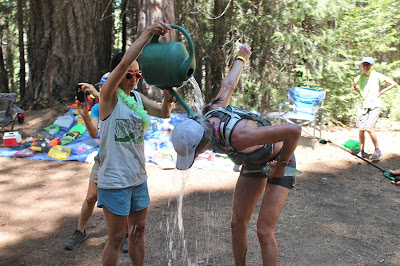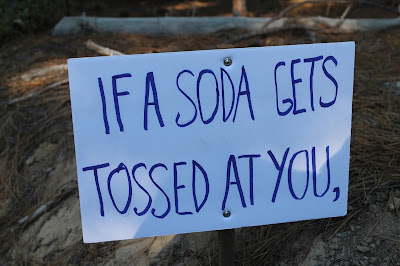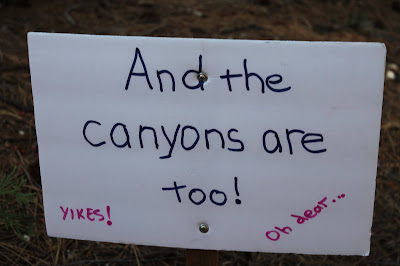Back in March of 2020, I was working from home and trying to anticipate how much longer this pandemic was going to keep me there. Probably at least until late April or maybe even May. Local races had been cancelled, but this was still feeling like a blip.
There was speculation about Western States - surely it won't be affected. The training runs were in danger maybe, but the race would happen.
Then came March 27th and the press release that seemed impossible. The race was off. The pandemic became a lot more real.
And I'm still working from home.
Fast forward to March 2021. Things are looking up. But how far up? Well, far enough up that the WSER training runs were on! And so was the race!
There would be some changes:
- Fewer volunteers at the aid stations, and those that were there would all be vaccinated. (Initially we were all to wear masks, but loosening restrictions made that not a thing.)
- A reduction in contact between the runners and volunteers, especially with filling of bottles and getting food.
- And, well that's about it. Crews and pacers were allowed. The finish line would be feel very familiar. This was going to feel like a real Wester States race!
Well, one difference would be the runners. There was no lottery for the 2021 race since all the runners from 2020 were moved to 2021. And there were provisions for deferring to next year for international runners since travel restrictions were still a thing. The end result was that instead of the allowed 369 runners at the starting line, there would be only 316 (and nobody left on the wait list).
One thing that felt normal was that, unlike 2019, it was predicted to be hot. Maybe really hot.
This tweet opened some eyes. That's 1600 pounds per aid station. Obviously, that's not the right way to look at this - some aid stations need far less and some will need more. But still, this was impressive.
When I showed up at the WSER warehouse with the van to pick up the ice for Last Chance, Lon said we would load as much as we could until the tires started popping. Then fix the tires and remove a bag or two. We ended up putting 1400 pounds in there.
 |
| So much ice! Oswald the ostrich (I rescued him - long story) was impressed. |
This was a bit more than we had ever used previously at Last Chance, and with almost 50 fewer runners than normal, this seemed to be way more than enough. But we really didn't want to risk running out, and since we are so remote, bringing an emergency load of ice to us later was not really possible. (Spoiler alert: It was more than enough.)
 |
| Would a smoke-free propane fire ring keep the mosquitos away? Maybe! |
As usual, many of us drove up to Last Chance on Friday - since sections of the road to the aid station are also used as part of the course, it's closed to vehicles at 9 AM; if you don't come on Friday, you better get up early on Saturday. (Another issue is that there is little to no cell service at Last Chance - there is no way to call ahead or get a pizza delivered.)
A fun surprise on Saturday morning was that RD Craig, President Diana, and aid station boss Lon showed up to give Lina and Peggy prestigious Friend of the Trail awards for their efforts captaining this aid station for the last 12 years.
 |
| Lina was not sure what was going on. |
 |
| Peggy, who knew what was going on for Lina, did not expect anything for her. |
Friend of the Trail awards are a big deal at this race, and they couldn't have gone to more deserving people. Sadly, Lina announced that this would be her last year as an aid station co-captain, which made this a bit bittersweet. (Stevens Creek Striders have run this aid station for 39 years - the longest such run of all the aid stations!)
The crew at Last Chance was between 30 and 40 all told - down by about 20 from normal. We needed to be a bit more efficient this year, but felt confident it would work out. (Yet another spoiler alert - it did.)
 |
| Efficient, friendly, focused, and now soaking wet, Jim headed out. |
As usual, our first runner was eventual winner Jim Walmsley, who came in ten minutes before the next runner.
Last Chance is at mile 43.3 of the 100.2 mile course. There are no crew or pacers allowed here, and it's the last aid station before the first of the really hot canyons - Deadwood Canyon - and the never ending switchbacks that take you up to the Devil's Thumb aid station.
Some runners just saw their crew a little over five miles before getting to Last Chance, and are tempted to just keep going and mostly skip us. These runners are not being smart, and will likely end up regretting that decision. (This year, very few runners skipped us - most found that all the ice they had loaded up with at Dusty Corners was already melted.)
 |
| The Last Chance (Mostly) Touchless Car Wash |
Normally we have a buckets filled with ice water and large sponges to squeeze that ice water onto the runners. Sponges often came into contact with the runners, and when put back in the bucket, created a less than hygienic environment. Sponges were not allowed this year, so we relied on plant sprayers (filled with ice water) and a last minute addition, plant water cans, also filled with ice water.
 |
| Eric taking the time to get very cooled off. Screams were often heard, followed by "but don't stop!" |
 |
| Eric also getting ice shoved in many places. |
We saw all manner of buffs, bandanas, hats with pockets, shirts with pockets - all places to shove in as much ice as fit. (Talking to several runners later, they said that the ice was mostly gone after just a couple of miles - just as they started their long climb.)
 |
| Katie shoved ice in places best not talked about in a family blog. |
 |
| This runner skillfully keeping their food dry. |
An interesting thing is that using the sprayers and watering cans resulted in us using less water than normal (and having less of a mud problem, although the heat might have had something to do with that).
Oh - the heat.
 |
| This thermometer was later shown mercy and moved to the shade. |
I like to set a thermometer in the sun to make the heat seem as bad as possible, in hopes of convincing the runners to take the time to get ice. It's usually not very hot at Last Chance, which can give the runners a false idea that the heat is not really that bad, so selling them on the idea of getting ice can be tricky. This is the first time in my eight years of bringing this thing that it's pegged out at 130. Yikes!
The goal was to be touchless, but we did end up handling hats, ice bandanas (which often were secured with a tough knot), and other miscellaneous things that need ice. Overall, we were significantly more hygienic than in previous years, and the runners didn't suffer because of that.
The food area was taped off and runners were not allowed to grab things - they were handed what they wanted either by way of tongs or a paper "boat". The variety of food was as normal - grilled cheese and lentil soup in addition to normal aid station fare.
 |
| The view as runners come into the aid station. |
In the end, everything went nicely. We had two runners drop here (usually we have none), and we never even came close to running out of ice or water.
Something that always fascinates me is what happens to the runners that come through in our last hour. 4:20 is the projected time you need to get here to be on a 30 hour pace (the race cutoff), and we officially close up at 5:25.
This year, we had 53 runners come in after that 4:20 time - 15 of those ended up finishing (most in the 29th hour, but one finished in the 28th hour and stunningly, one finished in the 27th hour!). 15 didn't make it past Devil's Thumb (the next aid station).
20 came in after 5:00 - three of those (all women!) went on to finish.
We know the odds are stacked against you if you come in that late, but we also know it's possible to beat those odds, so we will try very hard to prepare you for what's coming and to convince you that you are looking great and you've got this!
Because you often do got this!
As far as general thoughts about the race, the big story (other than the heat) was the women. Three made it into the top ten overall! Fifteen of the first thirty finishers were women! At Last Chance, there were no women in the top ten and only ten in the top thirty (the first woman we saw was number 19 - there was a ten minute window where we saw twelve women).
The women didn't have a Jim to try to catch - instead they had a bunch of smart runners that knew not to push too hard too early. They kept each other in sight as long as they could and suffered far fewer drops than the men. They ran smart races. (The winner ran the second fastest time in course history!)
Many of the men ran smart too, but quite a few ended up dropping after pushing too hard too early.
One other factor was that few elite male international runners ran this year - but several elite international female runners did. My guess is that early on, a few international male runners deferred and others followed their lead - and that the opposite happened with the females; a few didn't defer so others also decided not to defer.
Regardless, it was a very unique year in many ways. What will be interesting is to see how many entrants there are next year. The race is allowed 369 runners (due to a part of the course being in a wilderness area), but that limit is averaged over a five year period. By not having the race in 2020 and having a reduced number of runners this year, the next three years or so should be able to go well past 369 runners and still meet the rules. An important point is that it's not as easy as just throwing in more runners - many of the crew areas are already straining at capacity, so adding more crew wanting access to those areas will lead to issues - don't expect the number of runners to go up too dramatically, but do expect it to go up.
Which will make many runners very happy!
That's it - move along…
PS: I mentioned in the title this was my 10th year volunteering at Last Chance. I'm so thrilled I get to keep coming back each year - it's certainly a highlight of the year. The last thing you want to do is to ask me how it went. You do not have enough time for me to talk about it.
PS: You can see my post about the Last Chance signs here.





















































